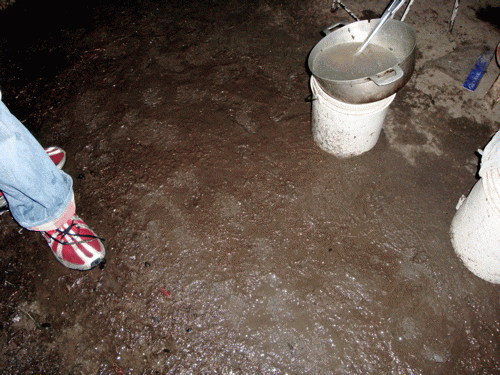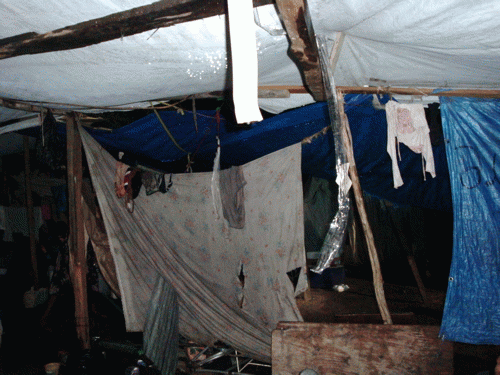This is my second trip to Haiti after the January 12 earthquake that killed up to 300,000 people and left 1.2 million homeless, although neither of those cold statistics will ever be verified. Boarding the American Airlines 757 at Miami International, the writer was confident that continuing the story would be much easier than the first time, After all, she knew her way around and had an agenda of people and IDP camps to visit, suggestions regarding places she had not visited, and a general sense of nuance about the challenges facing Haiti. The writer may have been confident, but she was wrong.
Something profound happened in the ten weeks since the writer left Haiti in March. Compassion entered the picture and became the lens that focused the dispassionate journalist's eye. You see, compassion can be a frightening and somewhat debilitating emotion if one is trying to be neutral and stick to the facts. Compassion is the earthquake of the soul that rocks the comfort of perception and shifts what once were solid foundations of reason. The writer thought that the words would pour forth with little effort, yet hour after hour went by and no words were formed. Two eighteen hour days passed, and still no sentences had formed into paragraphs when the writer stumbled into the lobby of the Plaza Hotel an hour ago. She had seen sights that no one should see, but two stuck in the mind. One was the sight of the withered, festering hand of an infant in a blistering hot tent serving as the critical care ward for Haiti's General Hospital, and the other was of a dignified grandmother who had lost three of her children in the quake and who now lay in a sobbing heap on the floor of her flooded tent, tears mingling with the incessant rain that poured down upon the Champ de Mars tent city, located not a football field's length from the ruined White House of Haiti in Port-au-Prince.
Those would seem to be easy accounts to write. But the writer had a block. It was not the burned out loss of thought, but it was an impenetrable barrier of fear. Fear that the words would not flow fast enough as memory and senses dulled and sights and sounds became overwhelming. Fear that it was so important to express how and why so many of the Haitian people are still suffering, and fear that it may be the writer's last opportunity to get this message across. Fear that there was no analysis that could solve the overwhelming problems of housing, food, a failed economy, too much foreign aid, too much corruption, and NGO's that were continuing to destroy Haiti's ability to move forward.
So we begin with the memory that is the easiest to access. Mac McKinney, my colleague from OpEdNews, and I had been discussing fear for most of the day on Monday. He has a nice photo essay about our night here. We wondered about external fear--the fear that Americans have of Haitians. There had been a brief demonstration at the Presidential Palace (White House) that we had decided not to report upon because we had not witnessed it. Rumors had it that the demonstration was in response to Haitians' dissatisfaction with the Preval government and that several demonstrators had been beaten, shot and gassed. Evidently a Reuter's reporter happened to be nearby and witnessed the event that was picked up by the wire services.
Fear was everywhere and especially in the ranks of volunteer workers who were either afraid to go out on the streets at night or were under contract with their umbrella organizations to not leave the hotel compounds. They were bussed to work and bussed back. A reasonable precaution that will discuss in future articles, but the volunteers were frustrated that they could not see conditions on the streets and in the camps. They were working out of context and they knew it.
On Monday evening there was a deluge of rain that lasted for hours. After spending the day revisiting Camp Canaan at the junction of Highways 1 and 9, looking at tattered blue tarps riddled with holes and the dirt floors that provided the beds for babies, we wanted to see what it was like to be out there in the rain with our own eyes and the dispassionate lens of the camera. Champs de Mars was within walking distance, but we took a car and parked along the curb in the refuse littered roundabout where floodlights illuminated the entrance to a rabbits' warren of passageways between tents that were really "homes" to the 52,000 people "living" there. Water was pouring from every horizontal surface and we did not find one dry tent. The smell of overflowing latrines lingered in the nose.
Mud was everywhere and so was despair and frustration. There was also resilience in the faces of the residents, determination, and a growing anger that no one was documenting this travesty. Mommas, Dads and Grandmas readily invited us into their homes to see the water collecting in pots and pans--saturating bedding and everything else. Children and babies were sleeping on sopping wet mattresses.
The only lighting came from the floodlights outside the perimeter and the overall effect was that the deeper you went into the tent city, the darker it became. Candles illuminated some passageways and the only thing alleviating the medieval feeling was the occasional sight of a light bulb hot-wired to an old car battery.
Mac disappeared into the bowels of the tent city, and the writer found herself alone as the thought flickered, "Should I be afraid?" " Is it foolhardy to be in this situation?" The answer was no. These people welcomed anyone who was interested in them and what they were experiencing. I don't know if it is true, but residents told us that no journalist had come into the tents at night and in the rain. The questions and affirmations flowed. "Why is Preval doing nothing?" "We need tents that don't let the water in." "My baby is sick, do you know what is wrong with her?" "My breasts can't make milk, can you find some baby food?" "Look at where my children are sleeping. They are cold at night and in the day it is too hot to stay in here." What will happen to us?" "Do you know Mrs. Obama?"
All the writer knew about Mrs. Obama was that her helicopter had landed on the grounds of the Presidential Palace (White House) a few weeks earlier and that it was likely her motorcade drove past this place, because every car that leaves the ruined government buildings must pass beneath the imposing statue of Henri Christophe, the man who led Haiti to independence from France in 1804 and became her president in 1811. Henri Christophe now watches over the 50-60 thousand residents of Champ de Mars.
The passageways were compelling. The writer pressed forward and wondered what would be in the next tent. How bad could this get? There had to be a limit. Then, a hand. A Grandma literally grabbed the writer's hand as she passed by the opening to the woman's tent.
Andre the translator said that the Creole words meant that Grandma wanted me to visit her home. It was like an invitation to a tea. The old woman was on her hands and knees trying to smooth a brown woolen blanket that she had positioned to cover the mud and water-soaked floor. Pots and pans lined the wall of the tent, collecting water she said she would use for drinking. Drops of water clung to every surface of the ceiling like stalactites in a cave. The woman was making her home presentable in the best way she could for the graying blond visitor with the camera.
As she knelt with her back to the writer, the Grandmother stopped the smoothing, stopped the straightening, and grew very quiet. Her shoulders began to heave and it was obvious she was wracked with sobs. The task was hopeless and the Creole cries were soft at first and then became a wail. Not knowing what else to do, the writer sat down in the water and touched the back of the elegant Grandmother. The damp wet wool chaffed at hands and exposed arms. Venice, for that is her ironic name, turned and began to laugh a kind of hysterical laugh at the woman who was now as wet as she was. It was literally tears turned to laughter at the confused writer's plight. A hug was offered and then the writer and Grandma collapsed into a heap on the wet floor as Grandma rested her head in the writer's lap and began her story.
(Note: You can view every article as one long page if you sign up as an Advocate Member, or higher).












